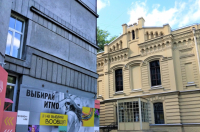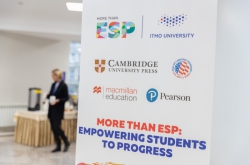It wasn’t just the allure of the Grand Canyon and a multitude of cacti that attracted the group from ITMO University to Arizona, the Center for English as a Second Language (CESL) at the University of Arizona (UofA) offers a special professional development program, known as CATT (Content Area Teacher Training), which is designed to assist content area teachers from around the world, with various disciplinary backgrounds to transition into teaching their subjects in English (be it chemistry, physics or programming) to students for whom English is not their native tongue.

While ITMO University already offers a host of English Language Masters courses, these are mainly geared towards international students, and not yet offered at the undergraduate level. The magic of English Medium instruction is that it’s not simply just about teaching in English in the same way you were teaching in Russian, but it’s about methods and approaches, it’s about scaffolding possibly difficult materials designed for native speakers of English, and about enabling students to get the most out of their learning experience regardless of potential language challenges. It is hoped that this course will spur on enthusiasm and motivation for more staff at ITMO University to begin offering courses in English at all levels.
"What I learned about EMI and English for Specific Purposes made me change my views about teaching in English for students for whom English is not their native language. I felt much more confident. In addition it was very interesting to plunge into the atmosphere of the campus of a major University and become familiar with the experience of teachers and the lives of the students," explained Artem Beresnev, senior lecturer for the Department of Intelligent Technologies in Humanities, sharing his impressions.

The 5 week course consisted of a 3 week online component and 2 week face-to-face session at the University of Arizona in Tucson. In participation were four content instructors from the Information Technologies and Programming Faculty, three content instructors from the Department of Informatics and Applied Mathematics, and three English language specialists from the Foreign Language Training Center.

Dr. Mouromtsev, Head of the Department of Informatics and Applied Mathematics commented that studying about "a systematic approach to teaching and learning in a second language allowed us to renew our approach to our courses and forced us to think about new ways of presenting educational material to students." He also commented on the effectiveness of the instructors who offered the course:
"I was very pleased to see the commitment and responsiveness on the part of the instructors at CESL. It was a lively and captivating interaction, where no question was left unanswered."

"English language teachers studied together with content teachers, so the course helped to get a deeper insight into what both parts are going to face teaching EMI. It is a great start for collaboration and support programs while implementing EMI at ITMO."

"The experience gained will be useful in developing courses in English." Not only was the internal collaboration among ITMO staff useful but also the international relationships that were cultivated during the visit which "will serve as fertile ground for cooperation and joint projects."





